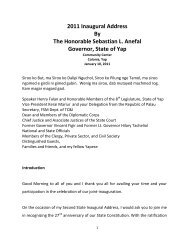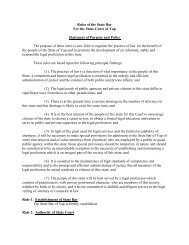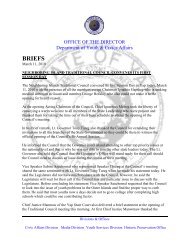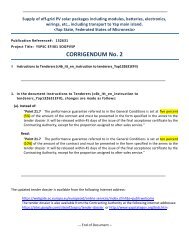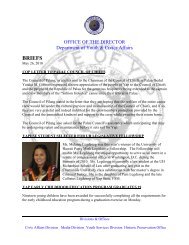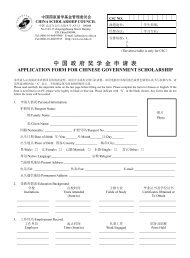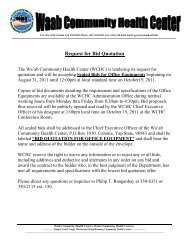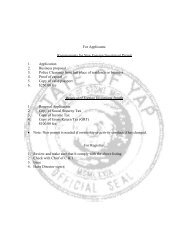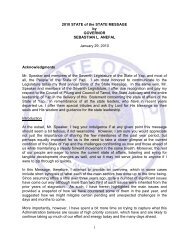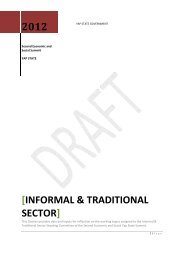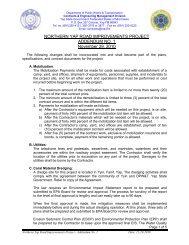RULES OF CIVIL PROCEDURE For the Trial Division of the Yap ...
RULES OF CIVIL PROCEDURE For the Trial Division of the Yap ...
RULES OF CIVIL PROCEDURE For the Trial Division of the Yap ...
You also want an ePaper? Increase the reach of your titles
YUMPU automatically turns print PDFs into web optimized ePapers that Google loves.
motion for relief from a judgment or order made pursuant to Rule 60, or <strong>of</strong> a motion for<br />
amendment to <strong>the</strong> findings or for additional findings made pursuant to Rule 52(b).<br />
(c) Injunction Pending Appeal. When an appeal is taken from an interlocutory or<br />
final judgment granting, dissolving, or denying an injunction, <strong>the</strong> court in its discretion<br />
may suspend, modify, restore, or grant an injunction during <strong>the</strong> pendency <strong>of</strong> <strong>the</strong> appeal<br />
upon such terms as to bond or o<strong>the</strong>rwise as it considers proper for <strong>the</strong> security <strong>of</strong> <strong>the</strong><br />
rights <strong>of</strong> <strong>the</strong> adverse party.<br />
(d) Stay Upon Appeal. When an appeal is taken, <strong>the</strong> appellant by giving a<br />
supersedeas bond may obtain a stay subject to <strong>the</strong> exceptions contained in subdivision (a)<br />
<strong>of</strong> this rule. The bond may be given at or after <strong>the</strong> time <strong>of</strong> filing <strong>the</strong> notice <strong>of</strong> appeal or <strong>of</strong><br />
procuring <strong>the</strong> order allowing <strong>the</strong> appeal, as <strong>the</strong> case may be. The stay is effective when<br />
<strong>the</strong> supersedeas bond is approved by <strong>the</strong> court.<br />
(e) Stay in Favor <strong>of</strong> <strong>the</strong> State <strong>of</strong> <strong>Yap</strong> or an Agency There<strong>of</strong>.<br />
When an appeal is taken by <strong>the</strong> government <strong>of</strong> <strong>the</strong> State <strong>of</strong> <strong>Yap</strong> or an <strong>of</strong>ficer or agency<br />
<strong>of</strong> <strong>the</strong> State <strong>of</strong> <strong>Yap</strong> or by direction <strong>of</strong> any department <strong>of</strong> <strong>the</strong> government <strong>of</strong> <strong>the</strong> State <strong>of</strong><br />
<strong>Yap</strong> and <strong>the</strong> operation or enforcement <strong>of</strong> <strong>the</strong> judgment is stayed, no bond, obligation, or<br />
o<strong>the</strong>r security shall be required from <strong>the</strong> appellant.<br />
(f) Vacant. (Stay According to State Law)<br />
(g) Power <strong>of</strong> Appellate Court Not Limited. The provisions in this rule do not limit<br />
any power <strong>of</strong> <strong>the</strong> appellate division or <strong>of</strong> a justice <strong>the</strong>re<strong>of</strong> to stay proceedings during <strong>the</strong><br />
pendency <strong>of</strong> an appeal or to suspend, modify, restore, or grant an injunction during <strong>the</strong><br />
pendency <strong>of</strong> <strong>the</strong> appeal or to make any order appropriate to preserve <strong>the</strong> status quo or <strong>the</strong><br />
effectiveness <strong>of</strong> <strong>the</strong> judgment subsequently to be entered.<br />
(h) Stay <strong>of</strong> Judgment as to Multiple Claims or Multiple Parties.<br />
When a court has ordered a final judgment under <strong>the</strong> conditions stated in Rule 54(b),<br />
<strong>the</strong> court may stay enforcement <strong>of</strong> that judgment until <strong>the</strong> entering <strong>of</strong> a subsequent<br />
judgment or judgments and may prescribe such conditions as are necessary to secure <strong>the</strong><br />
benefit <strong>the</strong>re<strong>of</strong> to <strong>the</strong> party in whose favor <strong>the</strong> judgment is entered.<br />
Rule 63. Disability <strong>of</strong> a Justice. If by reason <strong>of</strong> death, sickness, or o<strong>the</strong>r disability, a<br />
justice before whom an action has been tried is unable to perform <strong>the</strong> duties to be<br />
performed by <strong>the</strong> court under <strong>the</strong>se rules after findings <strong>of</strong> fact and conclusions <strong>of</strong> law are<br />
filed, <strong>the</strong>n any o<strong>the</strong>r justice regularly sitting in or assigned to <strong>the</strong> court may perform those<br />
duties; but if such o<strong>the</strong>r justice is satisfied that he cannot perform those duties, because he<br />
did not preside at <strong>the</strong> trial or for any o<strong>the</strong>r reason, he may in his discretion grant a new<br />
trial.<br />
Rule 64. Seizure <strong>of</strong> Person or Property. At <strong>the</strong> commencement <strong>of</strong> and during <strong>the</strong><br />
course <strong>of</strong> an action, all remedies providing for seizure <strong>of</strong> person or property for <strong>the</strong><br />
purpose <strong>of</strong> securing satisfaction <strong>of</strong> <strong>the</strong> judgment ultimately to be entered in <strong>the</strong> action are



